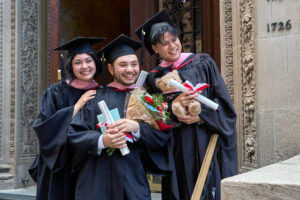Commencement: Curtis Celebrates the Class of 2024

On Saturday, May 11, at the historic Field Concert Hall, Curtis awarded degrees, diplomas, certificates, and special prizes to the 36 graduates of the class of 2024. Graduates received their diplomas and enjoyed the festivities with family and friends, alongside their fellow students.
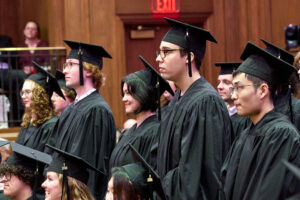
President Roberto Díaz presided over the ceremony, and speakers, including Edwin H. Case Professor of American Music at Columbia University, George Lewis, this year’s composer-in-residence; graduating bassoon and oboe students, Kahlan Yenney and Oliver Talukder, addressed the graduates and their families, faculty, staff, and friends; and alumna Yumi Kendall (Cello ’04), assistant principal cello of the Philadelphia Orchestra, welcomed the newest alumni. Mr. Lewis received an honorary Doctor of Music degree—presented by longtime Curtis trustee Anthony Creamer III—for his contributions to music and to Curtis.
“I want to welcome all of you today to this 91st Commencement at Curtis—graduates, parents, and families, faculty, trustees, staff, and friends. This is always a wonderful occasion. It’s also bittersweet for us because all of you that we’ve gotten to know so well over a few years, sometimes many years, go on to the next chapter of your life and your career. We couldn’t be more proud of everything you’ve accomplished so far, and we send you to the next part of your career with tremendous enthusiasm. We are looking forward to all of the great things that you will accomplish next.”
“One of my favorite sayings is, ‘Tradition is innovation that sticks.’ We have an idea of what playing in an orchestra is, being part of an opera company, or forming an ensemble, and yet, we rely on this traditional idea of what we think that is. But then we see things happen that are way beyond our control, whether it’s a pandemic or it’s social movements, and it forces us to reckon with the fact that we can’t forget we live in this world, in this society. We have to function in it and innovate to serve it better.
“Never have I seen what we do become more important and relevant than when there’s a really tough time we’re experiencing. People always turn to music. No matter where you’re from. No matter what you do. It’s the one place where they can find a common language that they can all relate to. It’s amazing to think that we get the opportunity to go out there, innovate, and become members of society—a huge congrats to all of you. I couldn’t be prouder. Come back, stay connected. Next year, it’s our 100th anniversary. We expect to see you back! All my best. Congratulations!”
—President and CEO Roberto Díaz
View the Commencement program (PDF)
Musical Offerings
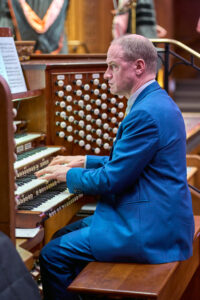 Andrew Senn (Organ ’00), director of music and organist at Church of the Redeemer in Bryn Mawr, Pennsylvania, provided the ceremony’s prelude, interlude, and postlude, opening the ceremony with Johann Sebastian Bach’s majestic Prelude in E-flat major, BWV 552/1 followed by Dan Locklair’s PHOENIX Processional as the students and faculty members entered Field Concert Hall.
Andrew Senn (Organ ’00), director of music and organist at Church of the Redeemer in Bryn Mawr, Pennsylvania, provided the ceremony’s prelude, interlude, and postlude, opening the ceremony with Johann Sebastian Bach’s majestic Prelude in E-flat major, BWV 552/1 followed by Dan Locklair’s PHOENIX Processional as the students and faculty members entered Field Concert Hall.
For the interlude, Mr. Senn played Orpha Ochse’s meditative Chaconne, and brought the ceremony to a close with a rousing performance of Louise Vierne’s Episcopal March, from Three Improvisations, and Bach’s Fugue in E-flat major (“St. Anne”), BWV 552/2.
View the Commencement video
Student Speakers
Graduating student Kahlan Yenney, principal bassoonist of Symphony in C, and former principal bassoon for the Berlin Opera Academy Orchestra, expressed gratitude to all those involved in supporting her dreams and those of her fellow classmates, shared memories of her time at Curtis, and the rising from the “ashes of remote learning” during the pandemic, to grow as artists and carve out careers as professional classical musicians out in the field.
“I can’t wait to see where the connections we have made here take all of us. Connections have been made, not just with fellow students, but with our awesome team of collaborative pianists, incredibly patient liberal arts and musical studies teachers—who at this point have achieved sainthood—and of course the incomparable performance faculty. No matter how much you try to envision your future, it is these people who will play a role in shaping it in ways you never could have dreamed of. Embrace the diverse perspectives, knowledge, and opportunities all of these people bring to the table, and craft something meaningful out of it. We’ve been given the time to put everything into our craft and now it’s time to give back and do something with it.”
Oboist Oliver Talukder, second oboist in the Opera Philadelphia Orchestra, first prize winner in the 2022 Midwest Double Reed Society Competition, and Outstanding Instrumentalist in the 2024 Sphinx Orchestral Partners Audition Competition, welcomed the new class of alumni, commended his colleagues for their resilience as they’ve navigated the uncertainty and hardships of being a musician in this post-Covid-19 world, and the camaraderie of Curtis graduates.
“One of the most powerful lessons I’ve learned during my time at Curtis is the art of phrasing. As musicians, we’re faced with designing, practicing, and executing musical phrases in everything we play. I like to think of our time at Curtis as a single phrase in the grand masterpiece that we call life. It has highs and lows, consonances and dissonances, monophony and polyphony… Music has the incredible power of bringing people together, and as the next generation of artists, I urge you all in your next phrases to use your beautiful and powerful voices, both on and off your instruments, and strive to build a future of peace, love, and community.”
Distinguished Guest Speaker
George Lewis, internationally acclaimed, award-winning composer, musicologist, author, computer-installation pioneer, and trombonist, received an honorary Doctor of Music degree and gave an inspiring speech on “necessary trouble” in the face of oppression. A fellow of the prestigious American Academy of Arts and Sciences, a corresponding fellow of the British Academy, and the recipient of the 2002 MacArthur Fellowship and the 2015 Guggenheim Fellowship, Mr. Lewis discussed his late friend, Curtis alumnus Julius Eastman (Piano and Composition ’63), the crucial lessons to be drawn from the art of music, and the historical context of “noise.”
“Those who would suppress our speech in our music have also learned to bring noise, this time as a means of obscuring the truth and confusing well-meaning people who just can’t figure out who’s telling the truth. Some among us are using this baleful world situation to presume an experiment in the destruction of liberal education whose object is the erasure of history and culture. This is a topic I’m quite familiar with from firsthand experience as I address what I’ve called the ‘cone of silence’ draped over the work of Afro-diasporic composers with my co-edited recent book, Composing While Black. Not to mention all those book-banners who always seem to find a problem with books by LGBTQ people and people of color. You know, they won’t stop there. Your right to rock and your right to rap is next, and classical music will not be exempt. There are still more erasures—our nation’s refusal to kick a tradition to white supremacy, homophobia, and patriarchy is triggering an autoimmune response that threatens the entire world. But even as these people are doing all that banning, they’re also admitting how much they fear your awesomeness as musicians.
“So, I’m certain that as was expressed in Frederic Rzewski’s set of piano variations on The People United Will Never Be Defeated, the unstoppable, and it was said by someone on this stage—one of the wonderful graduates [Oliver Talukder] who just gave his speech—I want to echo that by saying that the unstoppable combination of expressive awesomeness, with the power of the multitude, can turn back the bad faith policing of women’s bodies, and the militant suppression of trans identities. The history-makers can turn back to history-takers as we fight to keep our democracy real, to take back all the rights we’ve lost in just the past few years.
“I’m going to leave you with a concept that builds from a saying of the great John Lewis, whom I met in 2018 when we both received honorary doctorates from Harvard University. Dr. Lewis exhorted us all to get into trouble, good trouble, necessary trouble. So, I’d like you all to get out there. You know what to do. Make some noise—some good noise—because good trouble and good noise are really the same thing, the forceful assertion of alternatives in the face of oppression. I thank all of you again for this honor and I hope that you can all join me in making that good noise.”
Alumni Address
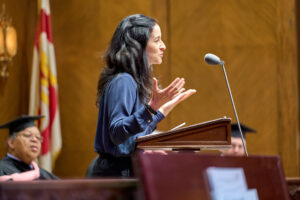 Acclaimed Curtis alumna Yumi Kendall (’04), assistant principal cellist of the Philadelphia Orchestra, inspiring citizen artist, podcaster, pedagogist, and educator, welcomed the new graduates. Ms. Kendall shares her experiences navigating the frightening moment in 2011 when her livelihood and close-knit artistic community was threatened when her beloved Philadelphia Orchestra filed for Chapter 11 bankruptcy. She discusses the inspiring steps she took in the face of uncertainty, including pursuing and receiving a master of applied positive psychology from the University of Pennsylvania. This path stemmed from her belief in classical music’s powerful role in human flourishing and the importance of cultivating healthy organizations as pathways to serve the arts and public community.
Acclaimed Curtis alumna Yumi Kendall (’04), assistant principal cellist of the Philadelphia Orchestra, inspiring citizen artist, podcaster, pedagogist, and educator, welcomed the new graduates. Ms. Kendall shares her experiences navigating the frightening moment in 2011 when her livelihood and close-knit artistic community was threatened when her beloved Philadelphia Orchestra filed for Chapter 11 bankruptcy. She discusses the inspiring steps she took in the face of uncertainty, including pursuing and receiving a master of applied positive psychology from the University of Pennsylvania. This path stemmed from her belief in classical music’s powerful role in human flourishing and the importance of cultivating healthy organizations as pathways to serve the arts and public community.
“My beloved mentor Claude Frank [Curtis faculty member from 1988–2014] once said, ‘The music is always better than it can be played.’ For me, these words encompass my forever student identity. They embody the curiosity and the constant questioning of being an artist—that we’re never finished. We must always be asking what more could be, what else could be.”
“As you embark on your own journeys through these doors, I invite you to think about your own Curtis treasure box and your own gems that you will take with you that may be shiny right now and that maybe years later will also shine and open doors for you. Let me be the first alumni on the other side of those doors to welcome you with wide open arms to a huge support network of caregivers and torchbearers of our art out there. Congratulations to the class of 2024.”
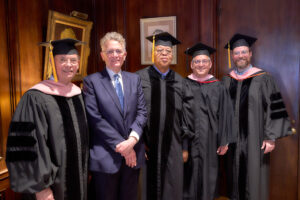
AWARDS AND PRIZES
Joan Hutton Landis Award for Excellence in Academics
Alexander Leonardi (Organ)
Edward Aldwell Award for Excellence in Music Studies
Tobias Matthew Vigneau (Double Bass)
Provost’s Award for Achievement in Career Studies
Chi Chun Adrian Wong (Composition)
Provost’s Award for Outstanding Citizenship
Leigha Amick (Composition)
Milka Violin Artist Prize
Lingyu Dong (Violin)
Charles Miller Prize: The Sergei Rachmaninoff Award
Yangyang Ruan (Piano)
Angelo Sylvestro Festorazzi Scholarship
Erik J Tofte (Opera)
Mehlin Prize
Avery Gagliano (Piano)
Hunter, Johnson, and Vernon Woodwind Prize
Asha Kline (Bassoon)
Charles Miller Prize: The Alfredo Casella Award
Maya Miro Johnson (Composition)
The Presser Scholar Award
Oliver J. Talukder (Oboe)
Diplomas and Degrees: Class of 2023
Certificate: 3
Diploma: 2
Post-Baccalaureate Diploma: 3
Bachelor of Music: 19
Master of Music: 9
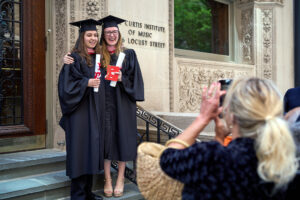
Commencement photography by Sharon Torello; Torello Productions.
